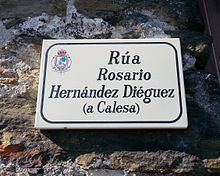Rosario Hernández Diéguez
Rosario Hernández Diéguez | |
|---|---|
 | |
| Born | 17 February 1916 Vigo, Spain |
| Died | 3 September 1936 (aged 20) Vigo, Spain |
| Other names | A Calesa |
| Occupation | newspaper hawker |
| Organizations | |
| Known for |
|
Rosario Hernández Diéguez (nickname, A Calesa; Vigo, 17 February 1916 – Vigo, 3 September 1936) was a Spanish Galician newspaper hawker and trade unionist, affiliated with Unión General de Trabajadores (UGT) and Spanish Socialist Workers' Party (Partido Socialista Obrero Español) (PSOE).[1] Raped, mutilated, tortured, she died young, a victim of Franco's repression.[2] A street in her hometown bears her name.
Biography
[edit]Rosario Hernández Diéguez was the daughter of an anarchist railwayman. Her home was on Calle Pino in Vigo. Everyone knew her by her nickname, "A Calesa".[3]
She worked as a newspaper hawker in the doorway of the society "El Gimnasio" on Calle del Príncipe,[4] reading out the news in the newspapers.[3] She visited the UGT's Casa del pueblo of the UGT, and attended PSOE meetings. In sympathy with the latter, she actively participated in the worker demonstrations of the time.[5][3]
Hernandez fled with the uprising of 18 July 1936. Captured and arrested on 3 September 1936.[a] Imprisoned in the city's María Berdiales Fronton, she received meals brought in by her sister, Maria.[6] Insolent, rather than submissive, devoted and obedient, she was shaved, raped, mutilated, and murdered[5] in a Falange barracks. Her body was anchored to an iron grill[6] before it was thrown off a boat in the Ria de Vigo, near the Cíes Islands.[3]
Legacy
[edit]
A street in Vigo's Coutadas area, between the Os Rosais institute and Travesía de Vigo bears the name Rosario Hernández Diéguez.[3]
In 2021, the story, "Rosario Hernández é un lugar", written by Marcos López Concepción, won the VIII Vigo Histórico Contest, organized by Editoral Elvira.[5]
See also
[edit]Notes
[edit]References
[edit]- ^ a b "Rosario Hernandez: La Calesa (1916 - 1936)". hoxe.vigo.org (in Spanish). Concello de Vigo. Retrieved 1 March 2023.
- ^ "Ruta por la huella de las mujeres de Vigo | Vivir Galicia". belaguaediciones.com (in Spanish). 10 February 2013. Retrieved 1 March 2023.
- ^ a b c d e Rolland, Eduardo (9 December 2011). "El nombre de una calle". La Voz de Galicia (in Spanish). Retrieved 1 March 2023.
- ^ Carbajo, Primitivo (1 June 2008). "Nombres de mujer para calles de Vigo". El País (in Spanish). Retrieved 1 March 2023.
- ^ a b c "Vigo Histórico hace justicia con «A Calesa», la joven violada y fondeada en la ría por falangistas". VigoÉ (in Spanish). 6 October 2021. Retrieved 1 March 2023.
- ^ a b "De Misisipi a Madrid: brigadistas negros contra el fascismo / B.I. memoria en todo el mundo / Asesinaron a Rosario Hernández Diéguez / 270.000 presos a partir 1940 / Opus Dei: la falange invisible de la Iglesia. – PRES.O.S." (in Spanish). presos.org.es. 16 April 2021. Retrieved 1 March 2023.
Sources
[edit]- Aurora Marco (2007). Dicionario de mulleres galegas (in Galician). A Nosa Terra. ISBN 9788483411469. OCLC 1026020579.
- Lomba, Antonio Giráldez (1999). "Tres nombres en el recuerdo de Vigo hace sesenta años: "El Comandante", "El Rabioso" y "La Calesa"". Boletín del Instituto de Estudios Vigueses (5): 31–44. ISSN 1135-1810.
